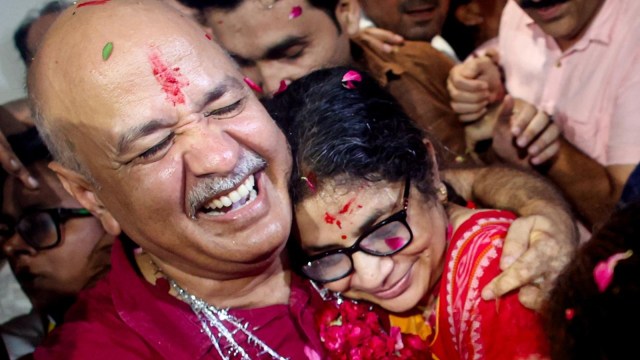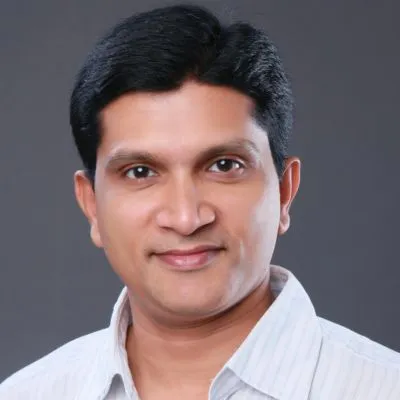Sisodia was arrested by the CBI on February 26, 2023, and by the ED 12 days later.

The bench of Justices B R Gavai and K V Viswanathan directed that Sisodia be released on a bond of Rs 10 lakh and two sureties of the like amount.
Story continues below this ad
“In the present case, in the ED matter as well as the CBI matter, 493 witnesses have been named. The case involves thousands of pages of documents and over a lakh pages of digitised documents. It is thus clear that there is not even the remotest possibility of the trial being concluded in the near future,” it said.
“In our view, keeping the appellant behind the bars for an unlimited period of time in the hope of speedy completion of trial would deprive his fundamental right to liberty under Article 21 of the Constitution. As observed time and again, prolonged incarceration before being pronounced guilty of an offence should not be permitted to become punishment without trial,” the bench said.
“We find that, on account of a long period of incarceration running for around 17 months and the trial even not having been commenced, the appellant has been deprived of his right to speedy trial.”
Sisodia was arrested by the CBI on February 26, 2023, and then by the ED 12 days later.
Story continues below this ad
The bench said it found no error in the judgment of the trial court and Delhi High Court insofar as their consideration of the merits of the case, but did not agree on the point that Sisodia was responsible for the delay.
“We have considered the order of both the special judge and the High Court… The learned Special Judge and the learned Single Judge of the High Court have considered the applications on merits as well as on the grounds of delay and denial of right to speedy trial. We see no error in the judgments and orders of the learned Special Judge as well as the High Court in considering the merits of the matter,” it said.
However, “the question that arises is as to whether the trial court and the High Court have correctly considered the observations made by the court with regard to the right to speedy trial and prolonged period of incarceration”.
“The courts below have rejected the claim of the appellant applying the triple test as contemplated under Section 45 of PMLA. In our view, this will be in ignorance of the observations made by this court in… the first order wherein this court specifically observed that right to bail in cases of delay, coupled with incarceration for a long time period should be read into Section 439 of CRPC and Section 45 of the PMLA,” the bench stated.
Story continues below this ad
It said that the High Court single judge had endorsed the finding of the trial court on the ground that the accused took three months – from October 19, 2023 to January 19, 2024 – “for inspection of un-relied upon documents despite repeated directions from the trial court to conclude the same expeditiously”.
“The trial court in its order has held that the appellant individually and along with the other accused persons have been filing one or the other application/making oral submissions frequently. It further observed that some of them were frivolous. It was observed that this was apparently done as a concerted effort for accomplishing the shared purpose of causing delay in the matter. The trial court, therefore, rejected the contention of the appellant that he had not contributed to delay in proceedings or that the case has been proceeding at a snail’s pace,” the bench said.
“However, in the very subsequent paragraph… the court observed that, in order to avoid any delay and considering the time being taken by the counsel for the accused in inspecting the ‘un-relied upon documents’, it had vide order dated 18th April 2024 put a query to the prosecution if the entire ‘un-relied upon documents’ can be provided to the accused persons in a digitised form. It further recorded that the ED accepted the suggestion that it would expedite the proceedings. However, some time was sought to consider the same,” it stated.
The bench said “a perusal of the compliance report filed by the Assistant Director of ED dated 7th May 2024… would reveal that the Cyber Lab has informed that it would take 70-80 days to prepare one copy (cloning) of the data contained in the said unrelied digital devices. It could further be seen that, though it has been submitted on behalf of the ED that hundreds of applications have been filed for supply of ‘un-relied upon documents’, the record would not substantiate the said position”.
Story continues below this ad
It said various applications were filed by different accused persons and Sisodia “has filed only 13 applications in the CBI matter and 14 in the ED matter”.
It said “most of the applications are for supply of missing documents and legible copies under Section 207, 208 of CrPC. Some of the applications are for inspection of the un-relied upon documents. It is further to note that all these applications have been allowed by the trial court”.
It said “when we specifically asked the learned ASG to point out any order wherein the learned trial judge found any of the applications of the appellant to be frivolous, not a single order could be pointed out. In that view of the matter, we find that the finding of the trial judge that it is the appellant who is responsible for delaying the trial is not supported by the record”.
The bench said that High Courts and trial courts should recognise that bail is the rule and jail is an exception.
Story continues below this ad
“From our experience, we can say that it appears that the trial courts and the High Courts attempt to play safe in matters of grant of bail. The principle that bail is a rule and refusal is an exception is, at times, followed in breach. On account of non-grant of bail even in straight forward open and shut cases, this Court is flooded with a huge number of bail petitions, thereby adding to the huge pendency,” it said.
The bench said Sisodia has “deep roots” in the society. “There is no possibility of him fleeing away from the country and not being available for trial. In any case, conditions can be imposed to address the concerns of the state.”
It said since the case largely depends on documentary evidence already seized by the prosecution, there is no possibility of tampering with evidence.
The SC recalled that in its first order dismissing his bail on October 10, 2023, the prosecution had assured that it would conclude the trial by taking appropriate steps within the next 6-8 months. In view of this, the Court had granted him liberty to move a fresh application for bail if the trial gets protracted.
Story continues below this ad
“A perusal of the material placed on record would clearly reveal that far from the trial being concluded within a period of 6-8 months, it is yet to commence,” it said.









